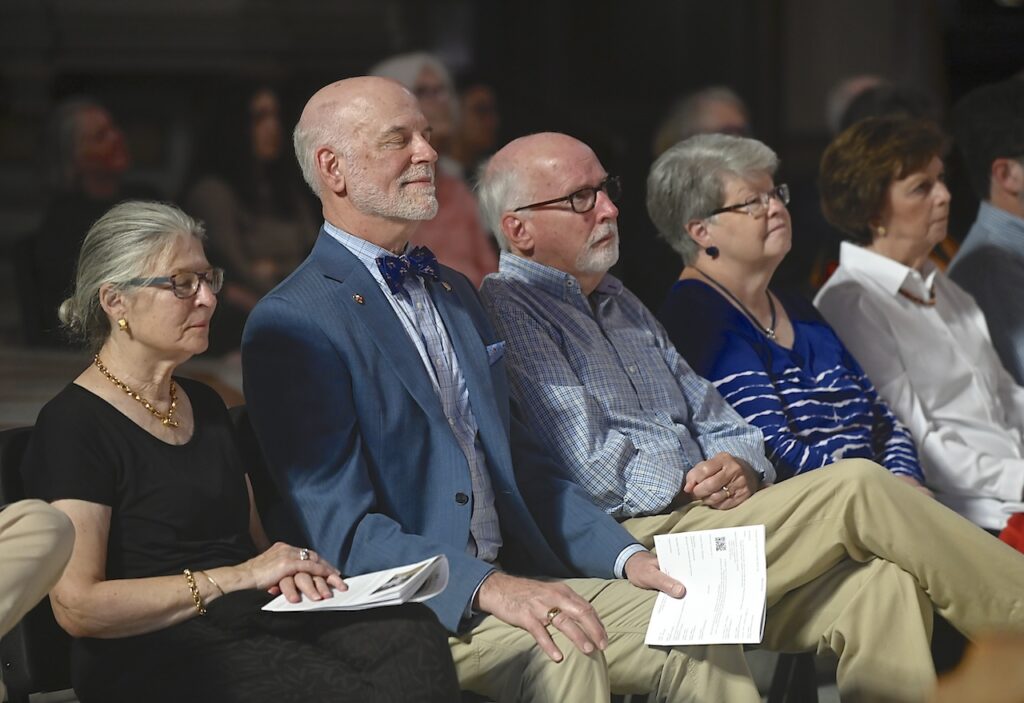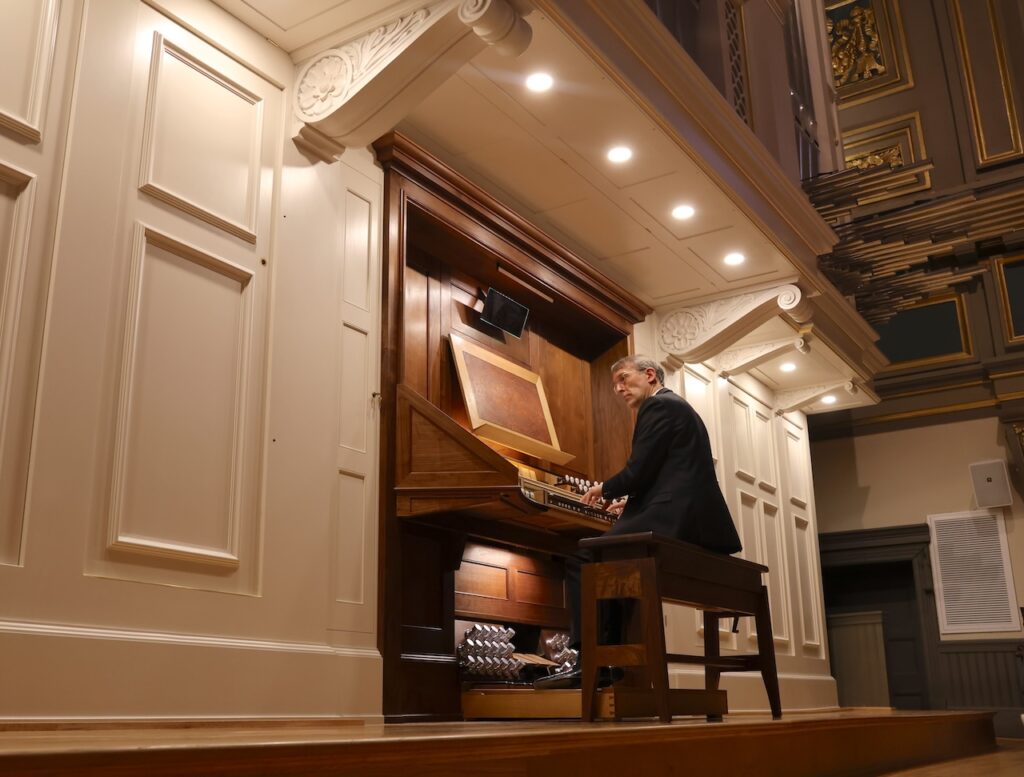On the night of Oct. 29, when Bishop Barry C. Knestout celebrated Solemn Vespers at the Cathedral of the Sacred Heart, Richmond, the limits of the new gallery organ were tested by Olivier Latry, a titular organist at Notre-Dame Cathedral in Paris.
Juget-Sinclair’s Opus 55 organ, blessed Sept. 15 by Bishop Knestout and played at every weekend Mass since, was in the hands of a master. Throughout the Evening Prayer service, the organ accompanied the cathedral choir during the recitation of psalms and motets, and, as is tradition, played “in alternim” – filling interludes with melodies ancient and new – during the Magnificat.
After the Salve Regina was sung to conclude Vespers, Latry played an improvised postlude that lasted nearly 20 minutes. It opened with a low, thunderous growl, swung dramatically higher into the unique glockenspiel and wind-chime pipes of the Opus 55, and gradually transformed into a full-throated blitz that played with the melody of the Salve Regina.
“He was shredding,” said Father Armando Herrera-Dos Reis, parochial vicar of Our Lady of Lourdes, Richmond, who was on hand to celebrate Vespers.
“I’ve never heard something like that,” said Bernard Fogg, Cathedral of the Sacred Heart usher. “This is a first time for everyone hearing something like that.”
It was a prelude of what was to come the following day, Oct. 30, as crowds packed the cathedral at 2 p.m. and 7 p.m. for the dedicatory concerts.
‘Superior in every respect’
After a brief introduction by Father Anthony E. Marques, cathedral rector, and Carey Bliley, chair of the organ committee, Latry introduced himself to the audience with a classic: “Prelude and Fugue in G Major, BWV 541,” by Johann Sebastian Bach.
After a quieter Bach piece and two excerpts from “Noëls” by Jean-François Dandrieu, Latry took the crowd underwater with heavy reverb and soft pipes in “Aquarium” by Camille Saint-Saëns, then made the pipes warble with “Volière” (“Aviary”), and soared gently through warm colors reminiscent of a synthesizer in “Cygne” (“Swan”).
The first act concluded with the triumphant chords of “Sonata No. 1” by Alexandre Guilmant.
“I felt like I was in a trance,” said Mary Jo Kelly, longtime cathedral parishioner.
Harry Bradley, who drove up from Greensboro, North Carolina, to attend the matinée, declared during the intermission that both organ and organist were as good as the billing.
“I knew I wanted to drive up to hear this instrument, and I am not disappointed,” he said.
“It’s amazing,” said Theresa Cruse, who made a shorter drive from Northside Richmond to hear the music. “He’s the best in the world, and it’s incredible to see someone so practiced play perfectly.”
Latry opened the second act with the cheerful “Grand Choeur dialogué” by Eugène Gigout, followed by a rendition of the famous “Carillon de Westminster” by Louis Vierne, a fantasia on the Westminster chimes, familiar to anyone who owns a grandfather clock.
The “Carillon” began quietly, gaining force as the familiar rhythm tolled through increasingly heavy pipes, and Latry masterfully allowed waves of warm sound to build. The friction coalesced at the climax like the stroke of noon at the gates of heaven.
A mournful lullaby on the memory of Vierne by Pierre Cochereau gave the audience space to breathe before the penultimate performance, “Syncopes Toccata,” by Thiery Pallesco, a blistering contemporary piece composed in a minor key.
Finally, it was time for a bit of drama. Daniel Sáñez, director of music and liturgy at the cathedral – and a masterful organist as well – walked down the nave, ascended the organ loft, and delivered a closed envelope to Latry. Inside was a previously unseen musical theme.
Latry played the theme once as written. Then, after perhaps 30 seconds of silence, he began to improvise, softly at first, playing a bit with the pedals.
Soon, the melody was hammering on the pedals through a wall of sound – but then, Latry took his foot off the gas, and as he did so, drew the softer notes into an unpredictable sonic kaleidoscope.
The musical journey primed the listener for a glorious return to the main theme, belted through the pipes and the trumpets. Latry had pulled out all the stops.
“It’s something to hear him,” said Scott Matthias, organist at the Cathedral of St. Thomas More in Arlington, who drove down for the concert. “I have heard Latry play before, but to hear him on the new organ is something exciting.”
Emotion showed on the face of Joseph Skudlarek as Latry performed an encore: “Toccata from Symphony for Organ No. 5,” by Charles-Marie Widor.
“It’s my favorite piece of organ music. I used it at the recessional at my wedding, and at the recessional when we buried my mother,” said Skudlarek, who was visiting from Portland, Oregon. His sister, Kathryn, is a parishioner at the cathedral.
“The concert was transportational. Superior in every respect. The instrument is gorgeous to look at, but the sound, the clarity… You’ve got all the colors, and he brought them all out,” Skudlarek continued.
“An organ is the voice of God when it is well played,” added Skudlarek. “This is a beautifully voiced instrument, giftedly played. … It brings one closer to their Creator.”

That night, Latry repeated the program, although this time, the concluding improvisational theme delivered by Sáñez was “Alleluia: Mode VI,” the Gregorian chant which often serves as the Gospel acclamation.
“It made your hair stand up the entire time,” said Brian Faison, a parishioner at St. Joseph, Richmond, who was attending with his wife and young daughter. “They had such a quality organist – it could be once in a lifetime experience to hear someone like that play right here in Richmond.”
Touching spirits and souls
The entire team from Juget-Sinclair Organbuilders made the trip down from Montréal for the dedicatory concert.
“As soon as Latry sat down and tried [the organ], it was clear it was a good fit,” said Alex Ross, Juget-Sinclair technician. “He took to it like a fish to water.”
“It sounds like Notre-Dame,” added Ross. “Someone was saying, ‘I saved you a plane ticket [to Paris].’”
As Bliley noted, Latry might be the world’s most famous organist. He has been a titular organist at Notre-Dame since 1985, and he regularly plays at the most famous classical music venues in the world.
Latry was effusive in his praise for the new organ.
“That instrument is very fabulous,” Latry said. “It’s probably one of the best in the United States right now.”
Before the show, Latry said he was both excited and scared by the awesome responsibility he had in playing the first public concert on the new organ. He will ride that roller coaster of emotions again on Dec. 8, when he will play at the reopening of Notre-Dame. The iconic cathedral in Paris has been closed since a devastating fire in 2019.
“It’s so nice to have this possibility to share the emotions – to share what we have in the heart and in the spirit,” said Latry. “Being a musician is sharing emotion. Being an organist is maybe something even more, because we are in a sacred space … we can really try to reach not only the spirit of the people, but also the soul.”
“The expectations for this instrument were high, and I am absolutely not disappointed,” Latry added. “I’m sure it will be famous in a very short time.”
See more on the new organ:
https://catholicvirginian.org/videoarchives/beauty-in-sound-part-i/
https://catholicvirginian.org/videoarchives/beauty-in-sound-part-ii/
Read about the arrival of the organ pieces in April.
Read about the installation of the organ, completed over the summer.

